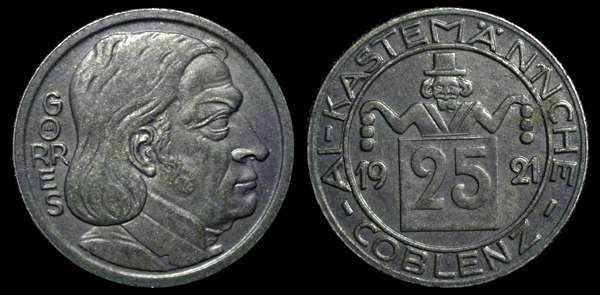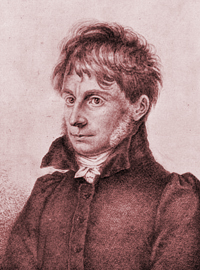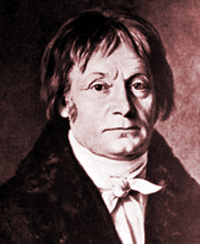
STADT COBLENZ (GERMAN) 25 PFENNIG 1921
F- 80.4 City of Coblenz (German) 25 Pfennig Notgeld Coin Depicting the Johann Joseph von Görres.
|
Coblenz (Koblenz) is an historic city situated on the banks of the Rhine where it meets the Moselle river. Although settlements have been in this area since at least 1000 B.C. and Julius Caesar visited around 55 B.C., It was first established as a military post by Nero Claudius Drusus Germanicus (Drusus) as "Castellum apud Confluentes", around 8 B.C., it derives its name from the Latin Confluentes (confluence) or 'merging of two rivers'. Modern Koblenz it is the third largest city in Rhineland-Palatinate (one of the 16 federal German states). Through its long history it has changed hands many times having been held mainly by Prussia or Germany but also briefly by Russia as well as France which occupied the the city several times, the last being after World War I. Like many cities it was severely damage during World War II and has undergone extensive post war reconstruction. Modern Koblenz has a population slightly over 100,000 and is known for it beautiful buildings, its theatres, a museum of antiquities, as well as a conservatory of music. It is a principal seat of the Mosel and Rhenish wine trade and also does a large business in the export of mineral waters. It is home to many manufacturing concerns which make automotive parts, pianos, paper, cardboard, machinery, boats and barges. Its situation on two rivers also makes it an important transit centre. The city is the home of the Deutsches Eck (German Corner) and its monument featuring the equestrian statue of the Emperor Wilhelm I. Johann Joseph von Görres was born at Coblenz on January 25, 1776. His father was Morits Görres, a timber merchant, his mother was from an Italian family who had immigrated to Germany and settled in Coblenz. Marits Gorres was man of reasonable means and sent his son to a latin college under the direction of catholic clergy. In his youth Görres embraced strong republican ideals and he looked with admiration upon the French Revolution as a movement to free the nations. What he felt to be reprehensible behavior of French nobility in exile on the Rhine only strengthened his distaste for royalty. In his earliest writings "Der allgemeine Friede, ein Ideal" in 1789 and the monthly publication "Das rote Blatt", which was continued in "Der Rüberzahl in blauen Grunde" in 1799, he strongly condemned the administration of the Rhenish provinces by France. He was one of several delegates sent by the Rhine and Moselle provinces to Paris in the 1799, to protest against the conduct of French officials in the Rhine country. his time in Paris disillusioned him towards the revolution and his thoughts are expressed in the pamphlet "Die Resultate meiner Sendung nach Paris" in 1800. In it he closes the first period of his life which was filled with plans and aspirations for the betterment of the human race and with bitter disappointments. During the thirteen years of Napoleon's dominion Görres lived a quiet life becoming professor of physics at the Sekundarschule (college) at Coblenz where he remained until 1806. On September 14 1801, he married Catherine von Lasaulx. In 1806 he moved to Heidelberg where he lectured at the university there and in 1807 he published "Die deutschen Volksbücher". In 1808 He returned to Koblenz and continued to teach as he studied Persian and wrote on that subject. By 1813 he had again took up the cause of national independence, and in the following year founded "Der rheinische Merkur". The intense earnestness of the paper, the hostility towards Napoleon, and its fiery eloquence secured for it almost instantly a position and influence unique in the history of German newspapers. Napoleon himself called it "la cinquième puissance" (the fifth power). It insisted on a united Germany with a representative government, but under an emperor as by now Görres had abandoned his early advocacy of republicanism. When Napoleon was at Elba, Görres wrote an imaginary proclamation issued by him to the people, the intense irony of which was so well veiled that many Frenchmen mistook it for an original utterance of the emperor. Görres was warned by the powers that be to temper his writing but he disregarded the warnings and continued the paper in all its fiery rhetoric. In 1816, at the instance of the Prussian government, he was censored and soon after dismissed from his teaching post. He continued his work as a pamphleteer writing and distributing "Adresse der Stadt und Landschaft Koblenz und ihre Uebergabe beim Fürsten Hardenberg" in 1818 and his brochure "Teutschland und die Revolution" in 1819. These works also were suppressed by the Prussian Government which confiscated his papers and issued orders for his arrest. He escaped to Frankfort, and from there to Strasburg. Here he remained save for a visit to Switzerland in 1821. During this time he wrote "Europa und die Revolution" in 1821 and "In Sachen der Rheinprovinzen und in eigener Angelegenheit" in 1822. Görres's pamphlet "Die Heilige Allianz und die Völker auf dem Kongress zu Verona" was a condemnation of the aristocracy who he claimed looked to suppress liberty. He was appointed Professor of history by King Ludwig of Bavaria in Munich where his writing enjoyed great popularity. There he published "Christliche Mystik", which consisted of biographies of the saints and an exposition of Roman Catholic mysticism. Görres was a lifelong Catholic and in this stage of his life he turned his attention to more religious matters becoming an outspoken advocate for the catholic church. Upon the imprisonment by the Prussian government of the archbishop Clement Wenceslaus for his refusal to sanction the marriages of Protestants and Roman Catholics, Görres wrote "Athanasius" in 1837 which fiercely upheld the power of the church and the absolute supremacy of Rome. Görres died at Munich on January 29, 1848. He is remembered as a fervent advocate for national independence and German unification, as an outspoken proponent for social equality, and a defender of the Catholic church. His writings were published in a collected form: "Gesammelte Werke, hg. von Marie Görres", 6 vols. (Munich, 1854-1860); also "Gesammelt Briefe, hg. von Marie Gerres u. Fr. Binder" (3 vols., Munich, 1858-74). |


